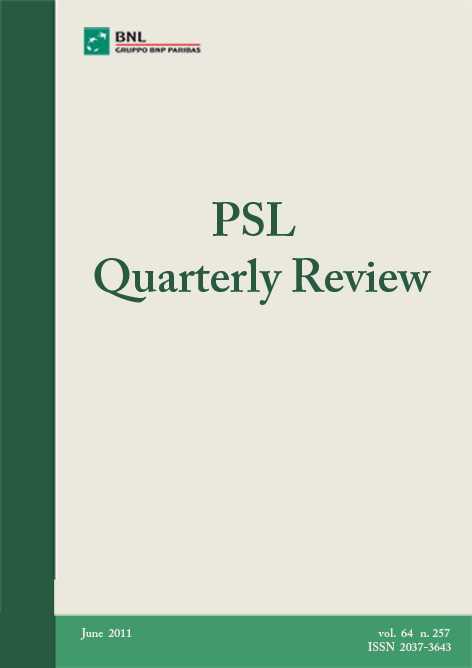Introduction: the crisis of economies and economics
DOI:
https://doi.org/10.13133/2037-3643/9414Keywords:
crisis, uncertainty, mainstream economics, EuropeAbstract
The article introduces to the current issue of the journal by critically reviewing the articles published therein in light of both recent literature and current economic developments. The main topics dealt with concern the role of mainstream economics and ideology in creating the cultural and economic environment that lead to the crisis in the first place and that hinders now an effective policy response to it. Due to its institutional and governance failures, the European Union and the Eurozone in particular are being more affected by the crisis than any other economic area. There, while the recently rescued big financial institutions have started enjoying large profits from trading and speculation again, the sustainability of sovereign debts is being put under pressure due to lack of confidence in the face of severe austerity packages and the associated bleak growth perspectives. Overall, uncertainty concerning the international political and economic environment seem the main hindrance to economic recovery. However, clear strategies to restore confidence and a seemingly stable and “certain” economic context are not apparent at the horizon, with the necessary consequence that the financial crisis is most likely to continue exerting strong negative impacts on the real economy for a sustained period.
JEL Codes: G01, B5, E12
References
ANELLI V. (2011), “Note bibliografiche: ALACEVICH M. (2007), Le origini della Banca Mondiale. Una deriva conservatrice, Bruno Mondadori, Milano”, Moneta e Credito, vol. 64 n. 253, pp. 75-85.
BOSI P. and D’ADDA C. (2011), “Politiche di sostegno della domanda in presenza di elevato debito pubblico”, Moneta e Credito, vol. 64 n. 253, pp. 45-52.
CARUANA J. (2011) “Building a lasting foundation for sustainable growth”, General manager’s speech, Bank for International Settlements, Basel, 26 June 2011.
COZZI T. (2011), “La crisi della macroeconomia”, Moneta e Credito, vol. 64 n. 253, pp. 31- 44.
DE CASTRO F., PÉREZ J.J. and RODRÍGUEZ VIVES M. (2011), “Fiscal data revisions in Europe”, Documentos de Trabajo, n. 1106, Banco de España, Madrid.
D’IPPOLITI C. (2011), “Introduzione: la crisi economica e della scienza economica”, Moneta e Credito, vol. 64 n. 254, pp. 95-104.
EUROPEAN CENTRAL BANK (2011), Financial Stability Review, June 2011, Frankfurt.
FRATIANNI M. and MARCHIONNE F. (2010),, “The banking bailout of the subprime crisis: size and effects”, PSL Quarterly Review, vol. 63 n. 254, pp. 187-233.
IEO (2011), “IMF performance in the run-up to the financial and economic crisis: IMF surveillance in 2004-07”, Evaluation report of the Independent Evaluation Office of the International Monetary Fund.
KREGEL J. (2011), “Uscire dalla crisi finanziaria statunitense: la politica domina l’economia nella Nuova Economia Politica”, Moneta e Credito, vol. 64 n. 253, pp. 15-30.
KREGEL J. (2011), “Resolving the US financial crisis: politics dominates economics in the New Political Economy”, PSL Quarterly Review, vol. 64 n. 256, pp.23-37.
MASERA R. (2010), “Reforming financial systems after the crisis: a comparison of EU and USA”, PSL Quarterly Review, vol. 63 n. 255, pp. 299-362.
PASINETTI L.L. (1998), “The myth (or folly) of the 3% deficit/GDP Maastricht ‘parameter’”, Cambridge Journal of Economics, vol. 22, pp. 103-116.
PASINETTI L.L. (1998), “European Union at the end of 1997: who is within the public finance ‘sustainability’ zone?”, Banca Nazionale del Lavoro Quarterly Review, vol. 51 n. 204, pp. 17-36.
PEDONE A. (2011), “Vecchi e nuovi problemi nell’impiego delle politiche di bilancio”, Moneta e Credito, vol. 64 n. 253, pp. 53-75.
QUADRIO CURZIO A. (2011), “Economie in crisi: Eurolandia dalla resistenza alla ricostruzione”, Moneta e Credito, vol. 64 n. 254, pp. 105-114.
REATI A. (2010), “Perché la teoria post-keynesiana non è dominante”, Moneta e Credito, vol. 63 n. 252, pp. 341-363.
RONCAGLIA A. (2011),“Macroeconomics in crisis and macroeconomics in recovery”, PSL Quarterly Review, vol. 64 n. 257, pp. 167-185
SYLOS LABINI P. (2009), “Le prospettive dell’economia globale”, Moneta e Credito, vol. 62 n. 245-248, pp. 61-89. English translation: “Prospects for the world economy”, PSL Quarterly Review, vol. 62 nn. 248-251, pp. 59-86.
TARKIAINEN, L., MARTIKAINEN, P., LAAKSONEN, M. and VALKONEN, T. (2011), “Trends in life expectancy by income from 1988 to 2007: decomposition by age and cause of death”, Journal of Epidemiology and Community Health.
TONVERONACHI M. (2010), “Empowering supervisors with more principles and discretion to implement them will not reduce the dangers of the prudential approach to financial regulation”, PSL Quarterly Review, vol. 63 n. 255, pp. 363-378.
Downloads
Published
How to Cite
Issue
Section
License



